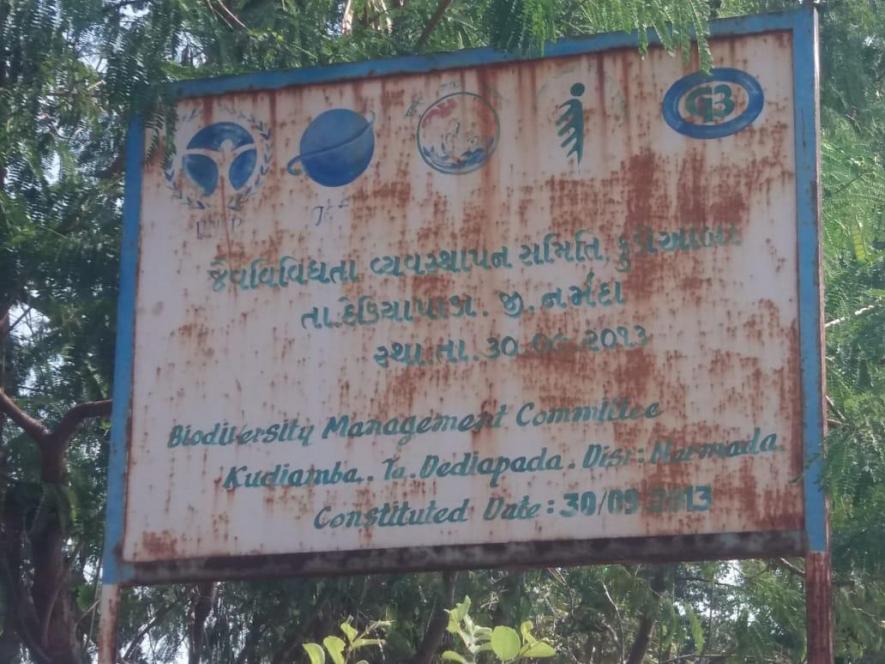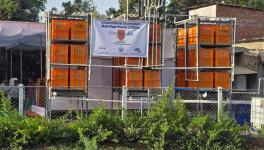Where Does the Benefit Sharing Money in Gujarat go?
Representational use only.
A couple of years ago, in December 2019, I was in the Dediapada block of Narmada district in Gujarat to visit a site of an Eco-Tourism project handled by an NGO. On our way back, I saw multiple boards on the main road mentioning the formation of Biological Diversity Committees (BMCs) in certain villages. The Boards were installed in 2013, but people had no idea what they were about.
On a later visit, we had a small meeting with Sarpanches, Panchayat members and volunteers. I asked them regarding the BMCs as mentioned on those boards. Some of them said they had heard of it (and read the boards on the road), but most people was unaware of what these committees were for or who were on these committees, indicating not just non-implementation of the Act but another example of the failure of a top-down approach of governance.
Dediapada is predominantly an Adivasi area and a notified Schedule V region. I had heard similar stories from my visits to Dahod and Dang districts- again Schedule V regions. We wanted further to understand this gap and the Biological Diversity Act (BDA) governance mechanisms in Gujarat.

Biodiversity Management Committee constituted in Kudiamba village in Dediapada block of Narmada district constituted on September 30, 2013. The committee is currently not active. The BMCs have to be formed every five years, in line with the schedule of the local body elections.
Biodiversity Regime and Access to Benefit-Sharing in India
The BDA was enacted in 2002 to set the policy framework for sustainable use of bio-resources and fair and equitable sharing of their benefits. India was one of the first countries to enact a separate law for governance mechanisms regarding issues related to biodiversity. The most important elements of this legislation are the provisions related to fair and equitable benefit sharing, which state that a share of profits arising out of commercial utilisation of bio-resources has to be shared with the people responsible for conserving the bio-resource or developing traditional knowledge of the same (basically, the local population). The Act also provides for the establishment of State Boards and Biodiversity Management Committees at the levels of local self-governance.
Companies and individuals exploiting the traditional knowledge and resources conserved by the indigenous and local populations worldwide had become the norm, infamously popularised by the grant of patent to two researchers in the United States to use turmeric to heal surgical wounds. After years of negotiations with all concerned nation-states, the Nagoya Protocol on Access to Genetic Resources and the Fair and Equitable Sharing of Benefits Arising from their Utilisation to the Convention on Biological Diversity was signed into to ensure that signatories establish a legislative, policy, and administrative mechanisms for equitable access to benefit sharing. Currently, the protocol has 131 signatories. While the Protocol has acted as a great guide in countries establishing a biodiversity framework, the domestic implementation mechanisms in India are still not clear.
There was no mechanism governing access to benefit sharing in India for 12 years after the enactment of the Biodiversity Act in 2002. It was only in 2014 that the National Biodiversity Authority (NBA) issued guidelines on Access to Biological Resources and Associated Knowledge and Benefits Sharing in the form of regulations. Under these guidelines, the BMCs at the local body level are supposed to receive 95% of the benefit-sharing amount paid by the commercial utilisers of bio-resources.
Suppose a BMC cannot be identified for benefit sharing. In that case, the amount shall be used to support conservation and sustainable use of biological resources and to promote livelihoods of the local people from where the biological resources are accessed.
Unaccountability and Non-Transparency in ABS Governance
The GBB, through an RTI reply, stated in February 2020 that a total of 4500 companies had received consent to operate under section 7 of the BDA, 2002. Of these 4500, 68 Access to Benefit Sharing Agreements were signed by the GBB with companies exploiting biological resources for commercial utilisation. Another RTI reply has revealed that the Gujarat Biodiversity Board has no data on how the benefit-sharing money it has collected from these companies has been spent over the past five years. In 2021, the GBB stated that active companies with whom benefit sharing is active are only nine, contrary to their declaration in 2020. It is pertinent to note that there is no separate contract regarding Fair and Equitable Benefit Sharing but has been just made a part of the contract recognising consent to operate under Section 7. There is also no mention of local communities or BMCs in these contracts. We can imply from these agreements that the companies have directly approached the GBB to gain consent to operate under Section 7 and have not engaged with the local people.
Furthermore, the documents provided by the GBB are silent as to whether procedure under Rule 16 of the Gujarat Biodiversity Rules, 2010 was followed. Rule 16 stipulates mandatory consultation with the local BMCs or local body, which involves issuing a public notice and formal consent from the assembly of the local body after being provided adequate information about the proposal and its implications for conservation and livelihood. This provision is important because if the local BMCs, as claimed by the GBB, were active and functioning, they would be negotiating a benefit-sharing model that benefits the local population. After perusing the nine agreements between the GBB and the companies, it is quite clear that a template paragraph of access to benefit sharing plucked out from the ABS Regulations 2014 has been put in all the contracts.
When the list of BMCs who have received benefit-sharing amounts was sought, the GBB unequivocally stated, "The GBB has not transferred the benefit-sharing amount to any BMC under Regulation 15(2) of the 2014 Regulations." The very people who are at the centre of the legislation and conserve biodiversity have been alienated by the GBB.
As stated earlier, according to Regulation 15(2), the State Biodiversity Boards have to mandatorily share 95% of the entire Benefit-sharing accrued with them with the BMCs. If the Board cannot ascertain the BMCs or individuals or groups of individuals with whom they have to share benefits, the Board will have to spend the money for conservation and sustainable use of biological resources and promote livelihoods of the local people from where the biological resources are accessed. In any case, the State Biodiversity Board has no authority or legal mandate to keep with itself the entire money accrued through benefit sharing.
Now, seeking exact documents and data as to how the money received through the Benefit-sharing amount collected in crores was spent, the GBB replied by sending the Annual Receipts and Payments Statement of the Board, which contained the Annual Statement within it of the Biodiversity Board. An appeal was then filed seeking specific details of how the ABS money was spent. To our surprise, their reply stated that they don't have the information sought in the format as requested.
It was clarified clearly that they could provide information in any format available. This meant that the only data maintained by the GBB regarding the ABS amount spent or received was in the format of the Annual Statement, and no account of the specific way in which ABS money has been spent is recorded. There is absolutely no data, framework or documentation available with the GBB to state how this money has been spent according to Regulation 15(2). This is quite problematic and reeks of insensitive governance, considering it is a well-known fact as to how companies exploit the local populations and utilise their traditional knowledge for their benefit without recognising their role. GBB's callous governance defeats the entire purpose of the Biological Diversity Act, and the ABS Regulations of 2014, along with India's international commitments. More importantly, it displays a sense of non-transparent government functioning bordering on impunity and non-compassion towards the communities responsible for conserving and sustaining our environment. The GBB, according to their RTI reply, doesn't keep data regarding the locations where commercial utilisation of bio-resources is conducted. This makes it impossible for them to hold the companies accountable or identify the local people or BMCs with whom they are supposed to share benefits.
The Misgovernance of the Gujarat Biodiversity Board
The State Biodiversity Boards are mandated to publish and make public their Annual Reports as per Section Section 33 of the Biological Diversity Act and Section 4(1)(b)(xi) of the Right to Information Act, 2005. While the point of misgovernance of Indian Departments might seem trite, it is of special significance in this context because of the lack of attention this legislation receives and the direct impact the lack of transparency and accountability can have on local communities and the country’s biodiversity.
When the GBB was posed with the question of how many BMCs are currently functioning in Gujarat, their reply stated that 13,578 Biodiversity Committees had been formed. The ground reality states otherwise. In the villages where BMCs have been stated to have been formed, the local body members have no idea of its formation, nor do the members of the Committee know that they are members of such a Committee.
Furthermore, the Guidelines for Operationalisation of Biodiversity Management Committees notified by the National Biodiversity Authority in 2013 lays down the Start-up funds to be released to the local BMCs. The BMCs at the Panchayat level are supposed to receive a startup fund of Rs 60,000. This fund is essential as it sets the documentation and conservation efforts into motion while bringing important funds into the villages, which can be used for further benefits of the population.
According to the initial reply of the GBB, 674 BMCs had received initial funding out of a total of 13,578. In a later reply in an RTI appeal, the GBB stated that the NBA Guidelines don’t mention anything about an “initial fund”. The GBB stated, “The initial fund is not mentioned anywhere in the NBA Guidelines, which is why we don’t have any such information.” This is quite extraordinary, as the NBA Guidelines on Operationalisation of BMCs stipulate a startup fund. It is not clear whether they gave this reply in the Appeal as the Guidelines mention startup fund instead of the initial fund. Both terminologies essentially mean the same, and if they have deflected the question based on alternate articulation, it goes against the spirit of the Right to Information Act, 2005. The proactive disclosures under Section 4(1)(b) are to make governance transparent and accountable, something that the GBB needs to have a thorough look at.
This also raises a larger question of what the leaders of these Departments see the Biodiversity Board as. From my observation, they are acting as post-offices, pro-active only when an RTI application is filed. The immense powers of the GBB in holding companies accountable whilst also helping the local populations in conserving biodiversity and creating livelihood options with the initial fund seems to have been entirely ignored by the people running this Department. If BMCs are not receiving their rightful entitlement under the Act, and the GBB’s accounts show credits under the head of Access to Benefit Sharing, the question is, where does the money accrued through benefit-sharing actually go ?
Aditya Gujarathi is a lawyer working as a Research Associate with the Centre for Social Justice, Ahmedabad. The views expressed are personal.
Get the latest reports & analysis with people's perspective on Protests, movements & deep analytical videos, discussions of the current affairs in your Telegram app. Subscribe to NewsClick's Telegram channel & get Real-Time updates on stories, as they get published on our website.
























